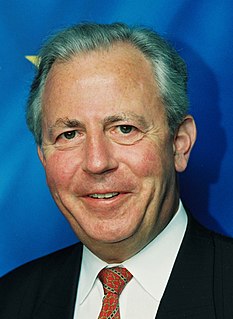A Quote by Jean Baudrillard
The era of the political was one of anomie: crisis, violence, madness and revolution. The era of the trans-political is that of anomaly: an aberration of no consequence, contemporaneous with the event of no consequence.
Quote Topics
Related Quotes
The founders of the United Nations sought to replace a world at war with a world of civilized order. They hoped that a world of relentless conflict would give way to a new era, one where freedom from violence prevailed.... But the awful truth is that the use of violence for political gain has become more, not less, widespread in the last decade.
For hundreds of millions of people, the fall of the Berlin Wall was a great triumph: The moment marked the end of hated dictatorships and the beginning of a better era. But for the KGB officers stationed in Dresden, the political revolutions of 1989 marked the end of their empire and the beginning of an era of humiliation.
The communications revolution has given millions of people both a wider and more detailed understanding of the world. Because of technology, ordinary citizens enjoy access to information that formerly was available only to elites and nation-states. One consequence of this change is that citizens have become acutely conscious of environmental destruction, entrenched poverty, health catastrophes, human rights abuses, failing education systems, and escalating violence. Another consequence is that people possess powerful communication tools to coordinate efforts to attack those problems.
There has to be a consequence to failure. Schools in the inner cities cannot be told, 'Oh, we want you to teach every child to learn how to read and, incidentally, if you fail to do that there's no consequence,' .. There has to be a consequence to failure, and the Title I money needs to follow the child.
The fact that you have a policy of such consequence directly affecting millions of people and you have a legal question of great consequence about the scope of the president's authority to act in implementing the immigration laws in this way and you have a one-line decision from the court affirming by an equally-divided court, it's an inevitable consequence of where we are.
The end of an age is always a time of turmoil, war, economic catastrophe, cynicism, lawlessness and distress. But it is also an era of heightened challenge and creativity, of issues, and their world-wide scope, never has an era faced a more demanding and exciting crisis. This then, above all else, is the great and glorious era to live in, a time of of opportunity, one requiring fresh and vigorous thinking, indeed, a glorious time to be alive.
As to the history of the revolution, my ideas may be peculiar, perhaps singular. What do we mean by the revolution? The war? That was no part of the revolution; it was only an effect and consequence of it. The revolution was in the minds of the people, and this was effected from 1760 to 1775, in the course of fifteen years, before a drop of blood was shed at Lexington.






































